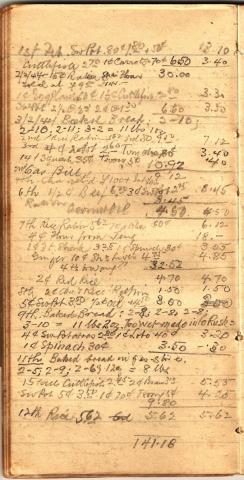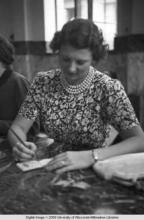70 years ago: Hong Kong's wartime diaries
1 - 12 Feb 1944, Tom Hutchinson's Wartime Diary
Submitted by barbaramerchant on Sun, 2013-09-15 15:40Book / Document:Date(s) of events described:Tue, 1 Feb 1944 to Sat, 12 Feb 1944Notes:
2/2/44 - 15 ((catties)) Ration Shai ((Shanghai?)) Flour 30.00 sold at ¥9.?0 ((9.40?)) = ¥141- ((Made ¥111 profit?))
2nd - Gas Bill 9.12
4th - Chu ret'd ¥100 + Int ¥9 ((?))
7th - 10 (catties)) Sh's Liver 4.75 4 t's ((taels)) to Wong
((Tom received 6 taels shark liver for free from Wong on 28/1/44))
8th - 2 ((catties)) Chu's Rice Ration 1.50 ((Tom buys Chu's rice ration?))Supporting information:
1 Feb 1944, R. E. Jones Wartime diary
Submitted by Admin on Mon, 2014-02-03 22:48Book / Document:Date(s) of events described:Tue, 1 Feb 1944Cold, windy & drizzly.
German lesson.
Hosp. 2 to 5pm.
Choir practice.
With Steve pm.
Formosans arrived?
01 Feb 1944, Chronology of Events Related to Stanley Civilian Internment Camp
Submitted by brian edgar on Sun, 2016-05-08 18:12Book / Document:Date(s) of events described:Tue, 1 Feb 1944Rudolf Zindel is back in Stanley - he wasn't allowed to visit in January, although he did manage to pay 'pocket allowances'. He interviews a number of internees and holds lengthy discussions with Franklin Gimson.
He reports to the Red Cross that conditions in the camp are unchanged from his previous visits, except that he found military guards for the first time. He notes that he's been told the flour ration has been replaced by an increase in the rice ration - which is also upgraded in quality, and that he hears favourable comments about the quantity of vegetables.
He also tells Geneva that he paid 2249 British internees their monthly 'pocket allowance' and made his usual monthly grant of M. Y. 3,000 to the Camp Relief Fund. He notes the payment of pocket allowances to 16 American internees - 3 more than last time.
Source:
Zindel to the ICRC, General Letter No. 32/44, 28 March, 1944, Archives of the International Red Cross (Geneva)
01 Feb 1944, INTERNED - DECEMBER 1941
Submitted by Clive Hamilton on Wed, 2017-01-04 15:51Book / Document:Date(s) of events described:Tue, 1 Feb 1944((Following text is not dated:))
We made our own entertainment during the years of captivity using makeshift props. Mosquito netting was soaked with a variety of medicines from bright mercurochrome to methylene blue, and made into frilly skirts. Jam tins were saved for helmets and crowns, with silver cigarette paper stuck on cardboard to resemble armour and shining swords. Japanese guards watched these performances, and didn't entirely approve of the mosquito netting. Rehearsals could not go on for too long, as it was so weakening.
Betty Brown, ((sic., actually Betty Drown)) Radio Hong Kong's pianist, provided music on the camp piano, composing and improvising for all the ballet shows, pantomimes, and vaudevilles which we put on at intervals. Carol Bateman, from Shanghai, put on the ballets; we were fortunate to have her...she gave Margot Fonteyn her first ballet lessons! The Japanese would not allow us to sing the National Anthem, but we were permitted to sing Rule Britannia! (We sang it with gusto accenting the never, never.) Perhaps we were allowed to sing it because the Japanese greatly admired the British Navy, and modelled their own on it.


